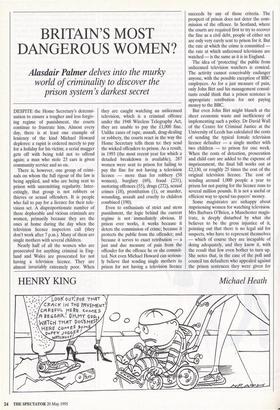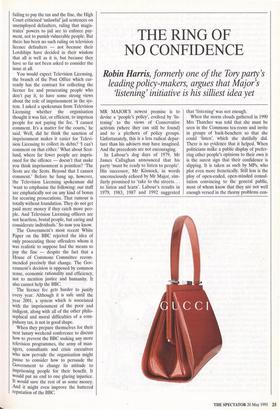BRITAIN'S MOST DANGEROUS WOMEN?
Alasdair Palmer delves into the mur
world of criminality to discover the prison system's darkest secret
DESPITE the Home Secretary's determi- nation to ensure a tougher and less forgiv- ing regime of punishment, the courts continue to frustrate him. Almost every day, there is at least one example of leniency of the kind Michael Howard deplores: a rapist is ordered merely to pay for a holiday for his victim; a serial mugger gets off with being told not to offend again; a man who stole 23 cars is given community service and so on.
There is, however, one group of crimi- nals on whom the full rigour of the law is being applied, and who are being sent to prison with unremitting regularity. Inter- estingly, that group is not robbers or thieves or sexual offenders. It is people who fail to pay for a licence for their tele- vision set. A disproportionate number of these deplorable and vicious criminals are women, primarily because they are the ones at home during the day when the television licence inspectors call (they don't work after 7 p.m.). Many of them are single mothers with several children.
Nearly half of all the women who are prosecuted for anything criminal in Eng- land and Wales are prosecuted for not having a television licence. They are almost invariably extremely poor. When they are caught watching an unlicensed television, which is a criminal offence under the 1948 Wireless Telegraphy Act, they are unable to pay the £1,000 fine. Unlike cases of rape, assault, drug-dealing or robbery, the courts react in the way the Home Secretary tells them to: they send the wicked offenders to prison. As a result, in 1993 (the most recent year for which a detailed breakdown is available), 287 women were sent to prison for failing to pay the fine for not having a television licence — more than for robbery (58 women), burglary (69), fraud (231), motoring offences (55), drugs (272), sexual crimes (18), prostitution (1), or murder, wounding, assault and cruelty to children combined (190).
Even to enthusiasts of strict and stern punishment, the logic behind the current regime is not immediately obvious. If prison ever works, it works because it deters the commission of crime; because it protects the public from the offender; and because it serves to exact retribution — a just and due measure of pain from the offender for the offence he or she commit- ted. Not even Michael Howard can serious- ly believe that sending single mothers to prison for not having a television licence succeeds by any of those criteria. The prospect of prison does not deter the com- mission of the offence. In Scotland, where the courts are required first to try to recover the fine as a civil debt, people of either sex are only very rarely sent to prison for it. But the rate at which the crime is committed the rate at which unlicensed televisions are watched — is the same as it is in England.
The idea of 'protecting' the public from unlicensed television watchers is comical. The activity cannot conceivably endanger anyone, with the possible exception of BBC employees. As for a just measure of pain, only John Birt and his management consul- tants could think that a prison sentence is appropriate retribution for not paying money to the BBC.
But even John Birt might blanch at the sheer economic waste and inefficiency of implementing such a policy. Dr David Wall of the Centre for Criminal Justice at the University of Leeds has calculated the costs of sending the typical female television licence defaulter — a single mother with two children — to prison for one week. When the costs of detection, prosecution and child care are added to the expense of imprisonment, the final bill works out at £2,130, or roughly 25 times the cost of the original television licence. The cost of sending around 1,000 people a year to prison for not paying for the licence runs to several million pounds. It is not a useful or efficient way to spend tax-payers' money.
Some magistrates are unhappy about imprisoning women for watching television. Mrs Barbara O'Brien, a Manchester magis- trate, is deeply disturbed by what she believes to be the gross injustice of it, pointing out that there is no legal aid for suspects, who have to represent themselves — which of course they are incapable of doing adequately, and they know it, with the result that few even bother to turn up. She notes that, in the case of the poll and council tax defaulters who appealed against the prison sentences they were given for failing to pay the tax and the fine, the High Court criticised 'unlawful' jail sentences on unemployed defaulters, ruling that magis- trates' powers to jail are to enforce pay- ment, not to punish vulnerable people. But there has been no such ruling on television licence defaulters — not because their Lordships have decided in their wisdom that all is well as it is, but because they have so far not been asked to consider the issue at all.
You would expect Television Licensing, the branch of the Post Office which cur- rently has the contract for collecting the licence fee and prosecuting people who don't pay it, to have some strong views about the role of imprisonment in the sys- tem. I asked a spokesman from Television Licensing whether the organisation thought it was fair, or efficient, to imprison people for not paying the fee. 'I cannot comment. It's a matter for the courts,' he said. Well, did he think the sanction of imprisonment makes it easier for Televi- sion Licensing to collect its debts? 'I can't comment on that either.' What about Scot- land, where far fewer people are impris- oned for the offence — doesn't that make you think imprisonment is pointless? 'The Scots are the Scots. Beyond that I cannot comment.' Before he hung up, however, the Television Licensing spokesman did 'want to emphasise the following: our staff are emphatically not on any kind of bonus for securing prosecutions. That rumour is totally without foundation. They do not get paid more money if they catch more peo- ple. And Television Licensing officers are not heartless, brutal people, but caring and considerate individuals.' So now you know.
The Government's most recent White Paper on the BBC rejected the idea of only prosecuting those offenders whom it was realistic to suppose had the means to pay the fine — despite the fact that a House of Commons Committee recom- mended precisely that change. The Gov- ernment's decision is opposed by common sense, economic rationality and efficiency, not to mention justice and humanity. It also cannot help the BBC.
The licence fee gets harder to justify every year. Although it is safe until the year 2001, a system which is associated with the imprisonment of the poor and indigent, along with all of the other philo- sophical and moral difficulties of a com- pulsory tax, is not in good shape.
When they prepare themselves for their next luxury weekend conference to discuss how to prevent the BBC making any more television programmes, the army of man- agers, consultants and crisis executives who now pervade the organisation might pause to consider how to persuade the Government to change its attitude to imprisoning people for their benefit. It would put an end to one glaring injustice. It would save the rest of us some money. And it might even improve the battered reputation of the BBC.



































































 Previous page
Previous page